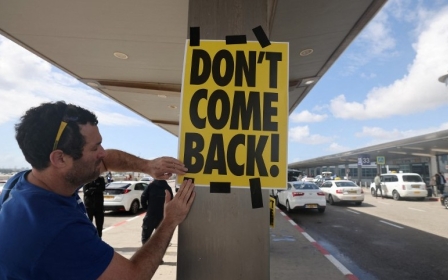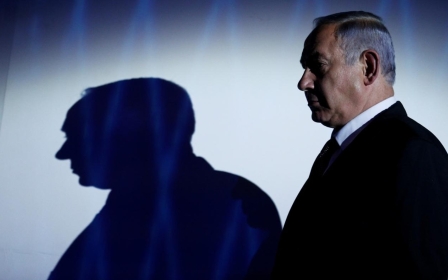Israel: Protests escalate against Netanyahu 'dictatorship'

Israelis marched in their thousands across the country on Thursday in what they are describing as an “escalating resistance to dictatorship”.
The far-right coalition headed by Prime Minister Benjamin Netanyahu this week continued to forge ahead with controversial legislation that would allow politicians to overturn Supreme Court judgements with a simple majority, as well as appoint judges.
'Extremists in the government are tearing us apart from the inside'
- Benny Gantz
Amongst the protesters in Tel Aviv was the former US ambassador to Israel, Martin Indyk, in a show of support.
“I am dismayed and very concerned about this judicial revolution and the impact it will have on Israel’s democracy – and therefore the impact it will have on the US-Israel relations,” Indyk told Haaretz.
There were clashes between police and demonstrators in Tel Aviv and at least 11 people were arrested across the country, where protesters blocked highways, ports and government buildings.
New MEE newsletter: Jerusalem Dispatch
Sign up to get the latest insights and analysis on Israel-Palestine, alongside Turkey Unpacked and other MEE newsletters
Efforts by the country’s figurehead president, Isaac Herzog, to seek a way out of the stalemate were rejected by Netanyahu, as he prepared to board a plane to Germany on an official state visit on Wednesday.
Herzog had been meeting for weeks with actors on both sides of the divide to try to reach an acceptable middle ground and his proposal appeared to offer incentives to both sides.
The former defence minister and deputy prime minister now turned opposition politician Benny Gantz, welcomed Herzog’s call for dialogue.
In a speech, Gantz urged Netanyahu to stop the country hurtling towards a “civil war”.
He went on to say that the "extremists in the government are tearing us apart from the inside."
Religious-secular tensions
The polarisation has also seeped into the country’s army.
Leading protests in Haifa, Israeli military reservists blocked one of the country’s main ports.
Other soldiers set up “army recruitment centres” in ultra-Orthodox parts of the city saying: “We have come to pass the burden of recruiting to the ultra-Orthodox population because if there is a dictatorship here, we will have to come here and recruit. We repeat: Without democracy, there is no people’s army.”
The tensions also underscore the divisions between secular and more religious people.
Hundreds of soldiers have also announced that they would boycott the army from Sunday.
"In the media, we read that the first law of the dictatorship, which prohibits the attorney general from declaring the prime minister unfit for office, will be voted on for a second and third reading on Sunday. The gun is firmly attached to the butt of democracy and the trigger will be pulled shortly,” they said.
In an overnight session earlier this week, the Knesset approved several pieces of legislation which amongst other things would prevent the country’s attorney general from declaring Netanyahu unfit for office.
The prime minister would only be declared unfit for office due to physical or mental inability and then only by the prime minister himself or by the vote of three-quarters of cabinet members.
Each of the bills requires additional votes before being enshrined into law.
Last week, Netanyahu had to be airlifted to the country’s main international airport for an overseas state visit after protesters blocked the road leading there, holding signs that read “don’t come back!”
Spiralling crises
Israel is in the midst of a political crisis that has pitted Netanyahu’s far-right government against the country’s civil society, academic and business elite, and former government ministers and military figures.
In an open letter on Sunday, more than 250 US business leaders and politicians warned that Israel’s judicial reforms will make it “increasingly difficult” to defend the country internationally.
“Many leaders in the business community will feel compelled to reevaluate their reliance on Israel as a strategic destination for investment, sourcing talent, building engineering centres, and maintaining intellectual property,” business leaders warned in their open letter.
Netanyahu is currently on trial for corruption, and the reforms could enable him to evade conviction or see his case dismissed.
Since being indicted in 2019, Netanyahu has railed publicly against the justice system, calling it biased against him.
Israel has been engulfed in political turmoil for over two months, as tens of thousands of people continue to take to the streets in mass protests.
Demonstrators want the government to scrap the controversial judicial overhaul plan that they say threatens checks and balances in the country.
Middle East Eye delivers independent and unrivalled coverage and analysis of the Middle East, North Africa and beyond. To learn more about republishing this content and the associated fees, please fill out this form. More about MEE can be found here.






